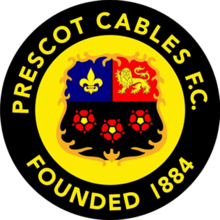Prescot Cables F.C.: Difference between revisions
{{Fs player|no=|pos= MF |nat=ENG|name=Matthew Devine|other=}}
{{Fs player|no=|pos= MF |nat=ENG|name=Matthew Devine|other=}}
{{Fs player|no=|pos= MF |nat=ENG|name=James Devine|other=}}
{{Fs player|no=|pos= MF |nat=ENG|name=James Devine|other=}}
{{Fs player|no=|pos= MF |nat=ENG|name=Adam Hammill |other=}}
{{Fs player|no=|pos= MF |nat=ENG|name=Adam Hammill |other=}}
{{Fs player|no=|pos= MF |nat=ENG|name=James Hammill |other=}}
{{Fs player|no=|pos= MF |nat=ENG|name=James Hammill |other=}}
{{Fs player|no=|pos= MF |nat=ENG|name=Elliot Owen |other=}}
{{Fs player|no=|pos= MF |nat=ENG|name=Elliot Owen |other=}}
Association football club in England
Football club
 |
|
| Full name | Prescot Cables Football Club |
|---|---|
| Nickname(s) | The Pesky Bulls, Cables |
| Founded | 1884 |
| Ground | The Joseph Russell Stadium, Prescot |
| Capacity | 2,500 |
| Chairman | Tony Zeverona |
| Manager | Steven Daley |
| League | Northern Premier League Division One West |
| 2022–23 | Northern Premier League Division One West, 9th of 20 |
| Website | Club website |
Prescot Cables Football Club is a supporter-owned football club based in Prescot, Merseyside. It was established in 1884 and has also been known as Prescot and Prescot Town. They compete in the Northern Premier League Division One West and play their home games at Valerie Park. They are a member of the Liverpool County Football Association.
The “Cables” in their name came from the largest local employer in Prescot, British Insulated Cables, which was founded in 1890 as the British Insulated Wire Company, and later became part of British Insulated Callender’s Cables. Prescot Wire Works were founder members of the Liverpool County Football Combination league and were runners three times in the years leading up to the First World War.
History[edit]
Prescot Cables joined the Lancashire Combination in 1927–28 taking over the record of Fleetwood who resigned after playing 22 matches. (Until 1968, when the Northern Premier League was formed, the Lancashire Combination was one of top leagues in the north-west of England). Cables came runner-up in the Combination on three consecutive seasons from 1930–31 to 1932–33.
In 1932 Valerie Park hosted its record attendance (8,122) in a game against Ashton National. Unfortunately for the Cables, the glory years were not to return for another 20 years.
The years 1954 to 1960 were probably the club’s most successful. In 1954–55 they finished Lancashire Combination Division Two runner-up and were promoted to Division One. The next season but one (1956–57) they finished champions of the Lancashire Combination. The following two seasons they were runners-up.
In 1954–55 the Cables registered their record victory in a competitive game (18–3) against Great Harwood.
In the F.A. Cup too the Cables shone. In 1957–58 they fought their way to the first round proper for the first time, only to be beaten away at Hartlepool United. They were in the first round proper again in 1959–60; this time they were beaten away at Darlington.
By 1975 fortunes at the club had dipped drastically. The Cables joined Mid Cheshire Football League and unsurprisingly they finished champions in 1976–77.
In 1978–79 they joined Cheshire County League as founder members of Division Two, finished League Division Two Champions in 1979–80 and won promotion to Division One. This was arguably the highest level of football being played at Valerie Park since 1968. Even better was to follow. In 1982–83 the Cables became founder members of the North West Counties League and in 1986–87 they won promotion to Division One.
Promotion to Northern Premier League[edit]
In 2001–02 they finished runners-up and the following season they were crowned champions. As a reward they were promoted to the Northern Premier League Division One.
In season 2004–05, they started playing in the Northern Premier League Premier Division, their highest ever flight in football. One of the main reasons for their rapid promotion was that the Football Pyramid underwent major changes in 2004. The Cables finished in 5th place that season following the FA’s decision to award them 6 points, thanks to the Spennymoor United failing to fulfil two fixtures against Prescot. The club took duly took their place in the playoffs only to lose 3–1 at Workington.
There was a change in organisation in mid-2005 when a new football committee formed from the Supporters’ Club took over the club. Andy Gray took over as manager following the resignation of Tommy Lawson. His side finish in mid-table for the following three seasons.
In the 2007–08 season the club finished in 13th position out of 21 clubs, although they needed a 3–2 success at Lincoln United to avoid relegation from the Premier Division. The Cables could not avoid the drop the following season, however, finishing…
Read More: Prescot Cables F.C.: Difference between revisions

